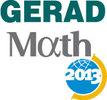HEC Montréal, Canada, 6 - 8 mai 2013
Journées de l'optimisation 2013
HEC Montréal, Canada, 6 — 8 mai 2013

TB9 Optimisation des trajectoires d'avions / Aircraft Trajectory Optimization
7 mai 2013 15h30 – 17h10
Salle: Dutailier International
Présidée par Jérémy Omer
5 présentations
-
 15h30 - 15h55
15h30 - 15h55Conception et analyse d'un système d'optimisation des trajectoires aériennes pour les avions
Nous présentons une méthode d’optimisation des trajectoires aériennes qui minimise tous les coûts associés au vol d’un avion. Nous minimisons le coût total du vol (coût du carburant, coût du temps, coût de survol des territoires) en tenant compte du type d’avion, des conditions météorologiques et des coûts de retard.
-
 15h55 - 16h20
15h55 - 16h20Interactions between Operations and Planning Decisions in ATC
In a context of growing trafic, it is necessary to determine which decisions can save money for companies. We present a study of the cost evolution of operations decisions when changing planning policies. Results will enlighten subjects for optimization and therefore indicate priorities for our future research.
-
 16h20 - 16h45
16h20 - 16h45EOSID Optimization with Genetic Algorithm
Aircraft takeoff weight is calculated on the SID trajectory considering the case of an engine failure. In case of mountainous landscape, an alternative trajectory can be designed to reduce obstacle constraints. This trajectory, called EOSID (Engine Out SID), is optimized with a genetic algorithm to maximize the takeoff weight.
-
 16h45 - 17h10
16h45 - 17h10Stochastic Programming with Recourse for Aircraft Separation under Uncertainty
The optimization of air traffic control aims at increasing the airspace capacity and flexibility of use. Meteorological forecast and trajectory predictions being inexact, uncertainty is an important issue. A stochastic program with recourse is thus developed to explicitly include errors on wind predictions and speed measures when separating conflicting aircraft.
-
 17h10 - 17h35
17h10 - 17h35Frameword for the Aircraft Conflict Resolution Problem
We propose a new framework for the conflict resolution problem, separating the model from the solver, to be able to: enhance the model with as many refinements as necessary, and compare different resolution methods on the same data. We compare an Evolutionary Algorithm and Constraint Programming on this optimization problem.

